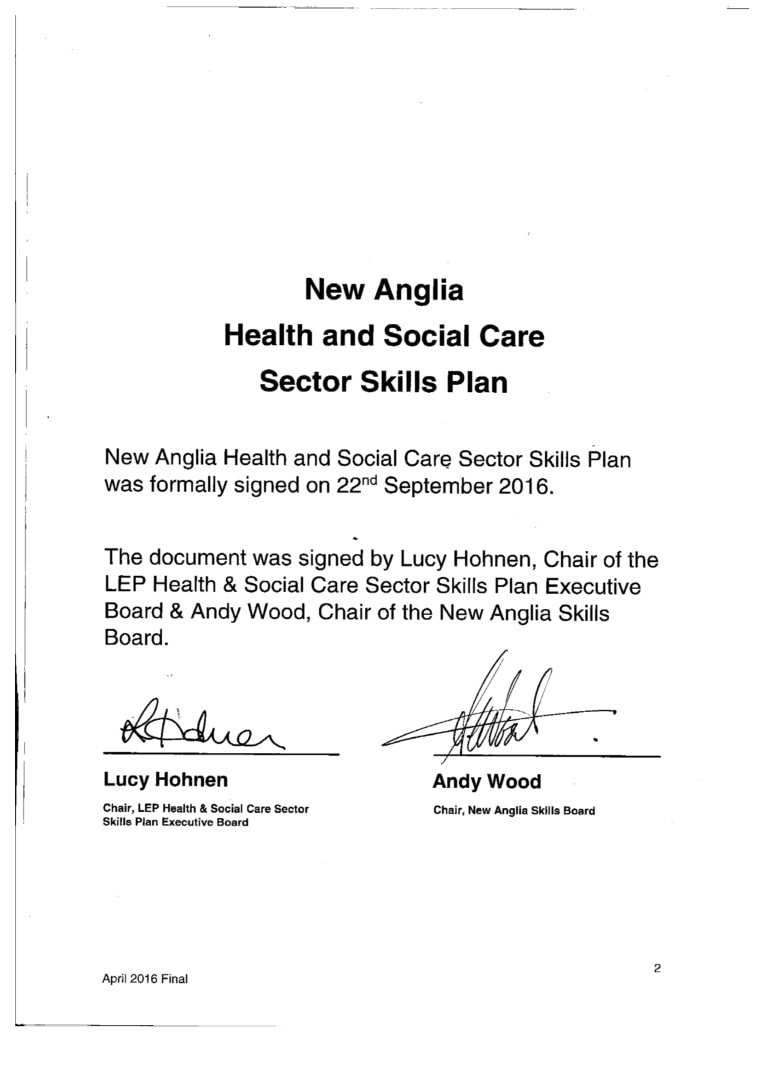New Anglia
Health and Social Care
Sector Skills Plan
A partnership plan to jointly address Norfolk & Suffolk’s
Health and Social Care Skills priorities
Presented to New Anglia Local Enterprise Partnership
19 April 2016
2
April 2016 V6
New Anglia
Health and Social Care
Sector Skills Plan
The Health and Social Care sector is one of the fundamental foundations of our
economy.
It is the largest sector in New Anglia in employment terms and plays an essential role
in tackling poverty, driving employment and thus productivity. The sector covers
services delivered by the NHS and private providers including hospitals, GP
services, residential care homes, day services, homecare and care in the
community.
Economic Growth
A healthy population is more productive, and more economically active and is a key
building block upon which the growth and success of our economy is built.
Expenditure on Health and Social Care in the UK has increased by approximately
120% since 2000 to over £150bn a year, meaning that the sector now accounts for a
significant proportion of GDP (over 10%).
In New Anglia the sector accounts for an estimated 102,700 jobs across Norfolk and
Suffolk, some 13% of total employment, making it the largest sector by employment
in this region. The sector has also been the fastest growing with an additional 12,000
jobs in the region since 2009 (a 12.2% increase). This is more than any other sector,
with almost 30% of new employment since the recession in New Anglia in health and
social care.
Employment in the sector is split between the private sector (58%) and the public
sector (42%) with the majority of employment related to human health, 25% in
residential care activities and 22% in social work activities.
As well as being the most significant sector by employment, Health and Social care
has an estimated Gross Value Added (GVA) of £2.8 billion, making it New Anglia’s
third largest sector by economic output.
The sector is projected to grow steadily (2.4% a year) and employment overall also
continues to rise. A high proportion of this growth relates to the higher skilled
occupations (degree level and above), the proportion of which is expected to rise in
the sector to around 39% by 2020 (higher than the average of all other sectors).
As well as contributing to economic growth directly, health and care services are also
major contributors to the wealth of other sectors (such as construction, IT, finance,
insurance, pharmaceuticals, catering and food suppliers, healthcare equipment and
consumables) as a consumer of services and products. It provides the primary
market for the life sciences industry - one of New Anglia’s identified growth sectors -
3
April 2016 V6
and is a source of exportable innovative ideas and expertise which can provide
business opportunities for Norfolk and Suffolk based businesses.
Increased demand
Growth in Health and Social Care is essential if the sector is to be able to respond to
an ever increasing demand for its services. The population of New Anglia is growing
and ageing at a rate above the UK average. This alongside other factors, such as
the continued rise of obesity, puts pressure on the sector. Across the country an
additional 6.5 million cases of heart disease and stroke, and between 492,000 and
669,000 additional cases of cancer are expected by 2030. The difference between
average life expectancy and healthy life expectancy continues to rise and is currently
15 years for men and 17 years for women.
We also know that demand is increasing and that simply maintaining existing levels
of employment in adult social care will not meet demand. The Centre for Workforce
Intelligence tells us that, nationally, the changes in population will bring a
33%
increase in demand for social care by 2030. We need to look at new ways of
meeting and managing that demand but there will still be a need to increase worker
numbers.
In short, Norfolk and Suffolk have:
•
A higher number of over 65s than the national average
•
A lower number of working age adults than the national average
•
An increasing number of years of ill health and disability before death
National data indicates that across adult social care in Norfolk and Suffolk 42% of
the workforce have no qualifications compared to a national figure for the sector of
32%. The data also indicates that the proportion of qualified staff in Norfolk and
Suffolk for levels 2, 3 and 4 and above is consistently 5 % lower than the national
figure.
This sector experiences high staff turnover, for Norfolk and Suffolk this fluctuates at
about 25%, with a vacancy rate of just over 4%.
It is clear that Norfolk and Suffolk needs an effective Health and Social Care sector
to support the growth of our local economy. It is therefore important to ensure that
there is a supply of the right skills for the sector in the local workforce.
Following extensive consultation across the health and social care sector, public
private and voluntary, the Health and Social Care Sector Skills plan project group
have identified 3 key areas of focus which are regarded as fundamentally important
to both health and social care. These are:
(1) Entrance and retention to the health and social care sector with a
particular focus on adult social care.
4
April 2016 V6
The turnover of some parts of our sector is extremely high. Some home care
providers, for example, report in excess of 50%. However the data also suggests
that, once in the sector, people are more likely to move around to other parts of the
system (other adult social care providers, children’s or health services) than to other
sectors. The negative perception of the industry (low pay, zero hours, low skilled,
limited career progression, media reports which report failing services) is more likely
to be held by those who have never worked in the adult social care or those advising
possible future workers than amongst the workers themselves.
We also know that demand is increasing and that simply maintaining existing levels
of employment in adult social care will not meet demand. The Centre for Workforce
Intelligence tells us that, nationally, the changes in population will bring a
33%
increase in demand for social care by 2030. We need to look at new ways of
meeting and managing that demand but there will still be a need to increase worker
numbers.
There is a ‘public relations’ battle to be won - re-framing the way in which care is
perceived and the enormous opportunities for a lifelong skilled and valued career in
a sector that employs over 71,000 people in Norfolk and Suffolk. There is also work
to be done to reduce the waste in the system that comes from unnecessary turnover,
employing and re-employing the same individuals in different parts of the system.
For example, the Care Certificate (a requirement for all new health and social care
workers) presents an opportunity to standardise induction processes.
Within this priority we also need to consider how the proposed changes to the
apprenticeship system are likely to impact on entry into the sector and ensure the
sector is suitably prepared.
(2) Recruitment and retention of registered nurses in nursing homes
The need for high quality nursing homes and the problems for the health and social
care system when a lack of nursing care results in additional demand on emergency
services, or delays in discharging people from hospitals are well documented.
The importance of nurses to the social care system and the wider healthcare system
has recently been highlighted by the pressures on Accident and Emergency
Departments in hospitals across England. It has been reported that on the 30th
November 2014 there were 5,200 patients in hospital who were ready for discharge
but were not able to because there were not suitable care arrangements in place.
Some of this pressure on the health and social care system has been attributed to a
shortage of nursing staff e.g. in “reablement‟ and “step down‟ services including
residential care with nursing. Representatives of independent social care providers
have recently commented that whilst nurse workforce planning may be taking place
in the NHS it has not been sufficient with respect to the independent sector.
(“Registered Nurses in Adult Social Care”, 2015, Skills for Care)
5
April 2016 V6
There is a consistently high annual turnover of registered nurses in nursing homes (c
40%) with no single identifiable reason why nurses leave. There are also issues of
‘perception’ within the profession. Despite the fact that nurses in nursing homes are
effectively nurse unit leaders, the role does not have high status, is felt to be highly
pressured
(with higher ratios of patients to nurses than elsewhere) and quite
isolated. Career progression is seen as limited.
We have an opportunity to draw on the resources and intelligence supporting the
current range of initiatives encouraging people into and returning to the nursing
profession. We need to enable nurses in nursing homes to access more easily the
range of professional development opportunities open to others to improve career
pathways between health and social care.
(3) Leadership and succession planning for registered managers and owners
of adult social care businesses
Leadership is regarded as pivotal to the quality of care and the working environment
of Care Quality Commission (CQC) registered providers, of which there are almost
1,000 in Norfolk and Suffolk.
Adult social care businesses: need to be agile, commercially minded and able to
respond to changing demands. The care provided must be high quality and safe (as
measured by CQC reports); and the working environment needs to be one in which
people feel well led and supported.
In Norfolk the turnover of Registered Managers is 16% and in Suffolk it is around 7%
so turnover is also a concern.
Our focus on this area is on both ensuring we have a good cadre of aspiring
Registered Managers and that the managers and owners are themselves effectively
supported both on appointment and subsequently.
Ownership and governance
Details of representation on the Health and Social Care Sector Skills plan project
group can be found at Appendix 1.
To ensure clear ownership of the actions included within this sector skills plan an
Executive Board and governance framework has been established and can be found
at Appendix 2.
Supporting data
The sector skills action plan development was based on an analysis of local data
which is summarised in Appendix 3.
6
April 2016 V6
PRIORITY 1
Entry and Retention in the Health and Social Care Sector
A cross-region, multi-media campaign to increase the number of quality individuals
Action 1
recruited by the health and social care system
Description
The nature and size of the New Anglia workforce needs to respond to increasing demands
for health and social care services. By working in partnership across Norfolk and Suffolk
the sector will plan, prepare and deliver coordinated and targeted local promotional
campaigns to ensure there is awareness of the breadth of career opportunities within the
sector, including career pathways between health and social care.
Our intention is to re-frame and enhance the image of the sector and attract a more diverse
local workforce The campaign will include the support and recruitment of I…Care
Ambassadors and Health Ambassadors to work with schools and colleges and those who
provide careers guidance.
Such a coordinated approach will also help to address the recruitment challenges present
when there is a diverse adult social care provider market with 1,000s of independent
providers by presenting the career opportunities as part of a unified pathway.
This action will build on work already being undertaken in the sector including the delivery,
by Suffolk Brokerage and Norfolk and Suffolk Care Support, of the I…Care Ambassador
scheme, the NHS Health Ambassador Scheme and the recently established Care Careers
Suffolk brand. It will also capitalise on opportunities arising from ongoing skills activity such
as the local economy online platforms in both counties and the New Anglia Youth Pledge
This action will contribute to the New Anglia Skills Manifesto by:
Strategic Links
• Linking to the New Anglia work inspiration offer to ensure that all young people
have access to the information they need to make informed decisions about their
future.
• Supporting employers to better communicate their current and future skills needs to
schools, colleges, universities and government.
• Helping to increase the supply of high level apprenticeships
Start Date
May 2016 -
Individual organisations and partnerships already undertake a wide range of work in this
area. This action is about co-ordination of existing initiatives, identifying and meeting gaps.
Expected End Date
Progress review November 2016
Estimated costs and
£45,000 funding already secured from Better Care Fund, Health Education England (East),
resource implications
Norfolk & Suffolk County Councils to provide a Project Officer will significantly contribute to
this priority.
Estimated campaign costs £40,000
It is also expected that financial and resource commitments will be required from a wide
group of stakeholders including Local Authorities, CCGs, health and care providers,
NALEP and Health Education England (East).
Potential funding source:
New EU Calls to Overcome Gender Stereotypes in Education & Workplace
Action grants to support transnational projects to promote good practices on gender roles
and to overcome gender stereotypes in education, training and the workplace
Ownership and
Christine Futter - Norfolk & Suffolk Care Support
Accountability
Louise Whitley - Suffolk Brokerage
Reporting to the Health & Social Care Skills Sector Executive Board
7
April 2016 V6
Milestones
Date
Project Steering Group Established
June 2016
Existing initiatives and new work identified
June 2016
Key Activities
Co-ordinated campaign begins
September
This will include a coordinated approach to use of cross-sector initiatives
2016
such as ICanBeA and the New Anglia Youth Pledge.
Further milestones will be detailed in the campaign plan
Measures of Success
• There is an increased supply of good quality applicants interested in working in the
sector. (evaluation of campaign)
• Vacancy rate across all social care providers has reduced - especially in home
care
• Increase the number of new apprenticeships aged 16 to 24
• Increase the number of higher apprenticeships in the sector.
PRIORITY 1
Entry and Retention in the Health and Social Care Sector
Action 2
A sector-owned and branded ‘recruitment centre’ for adult social care
Description
The ‘recruitment centres’ will be established as a business model. They will source suitable
candidates (apprenticeships and workers), deliver pre-entry training (linked to the Care
Certificate) and explore opportunities for an Apprentice Training Agency for rotational
apprenticeships across health and social care.
They will also work in support of local or place-based initiatives in the recruitment initiatives
This action will help reduce turnover rates which are particularly high in some sectors (such
as home care) by helping ensure that candidates are appropriately prepared and
understand the requirements of the working world they are choosing to enter
Given the geography of Norfolk and Suffolk, initial work will look at piloting a ‘recruitment
centre’ in both counties.
This action will build on work already being undertaken in the sector including the
development of rotational apprenticeships by Health Education England (East) and the
existence of funded apprenticeship co-ordinator by Suffolk County Councils. Both Suffolk
Brokerage and Norfolk and Suffolk Care Support, funded by the Norfolk and Suffolk County
Councils already provide of support on recruitment and retention to the sector including
signposting, advice and recruitment events.
Strategic Links
This action will contribute to the New Anglia Skills Manifesto by:
• Linking to the New Anglia work inspiration offer to ensure that all young people
have access to the information they need to make informed decisions about their
future.
• Helping to increase the supply of high level apprenticeships
Start Date
October 2016 - Business proposal for consideration
Expected End Date
Established by April 2017
Estimated costs and
Start up funding to support detailed business plan approximately £300,000
resource implications
Ownership and
Christine Futter - Norfolk & Suffolk Care Support
Accountability
Louise Whitley - Suffolk Brokerage
Reporting to the Health & Social Care Skills Sector Executive Board
8
April 2016 V6
Milestones
Date
Project Steering Group Established
June 2016
September
Business Plan drafted
2016
Key Activities
Development of concrete costed proposals
October 2016
Further milestones will be detailed in the costed proposals
Measures of Success
• Creation of a recruitment centre
• An established sustainable recruitment centre meeting the needs of the sector
9
April 2016 V6
PRIORITY 2
Recruitment and Retention of Registered Nurses in Nursing Homes
Actions 1
Improving the perception and career opportunities for nurses in nursing homes.
Description
• Supporting and developing nursing homes in order to be able to provide
placements to pre-registration Nurses and other pre-registration health care
students, ensuring that the placements meet the necessary regulatory
requirements and enable the students to meet their learning outcomes during all
years of their programme (across health and social care sector)
• Implementation of practice based learning models using a coaching method to
support pre-registration students in practice
• Developing and supporting the sharing of CPD opportunities within Norfolk and
Suffolk allowing cross organisational and cross sector learning.
• Development and implantation of career framework/pathway ensuring leadership
development is embedded throughout.
• Implementation of a preceptorship package and minimum offer for newly qualified
nurses. This includes CPD opportunities and a preceptor during their first year of
Qualification.
• Advertise, actively recruit and support Return to Practice students.
• Increase the awareness of education and student support within the sector
• Increase the number of qualified mentors and practice educators within the sector.
• Piloting rotational and secondment opportunities across NHS, Private and social
care sectors to support staff with their development.
• Support NMC revalidation of Nursing within the care sector
Health Ambassador Schemes
Directors of Nursing
Health Education England (East)
Suffolk Association of Independent Care Providers (SAICP)
Strategic Links
Norfolk Independent Care (NIC)
This action will contribute to the New Anglia Skills Manifesto by:
• Ensuring there are clear and complete training pathways for each sector that
enable people to get into and progress within their chosen career and develop the
higher level skills needed.
• Aligning collective effort to meet the skills needs of the sector
Start Date
September 2016 - this will need to link with the Norfolk and Suffolk Workforce Partnership
Group work programme.
Expected End Date
August 2019
Estimated costs and
Appointment of a clinical Educator to support pre-registration placements and
resource implications
implementation of practice based learning model including the role of peripatetic mentor
£495,000 over a 3 year period (3 eqv band 6 afc)
CPD funding to support preparation for mentorship and practice education development
costs would need to be ascertained after TNA has been completed.
Ownership and
Laura Mallett - Health Education England (East)
Accountability
Reporting to the Health & Social Care Skills Sector Executive Board
10
April 2016 V6
Milestones
Date
Project Plan produced
Sept 2016
Training needs analysis of mentorship completed
Dec 2017
Funding secured
March 2017
Key Activities
Clinical educators appointed
May 2017
Development of new placement areas
June 2017
Further activities will be detailed in the project plan
Measures of Success
• Reduction in loss of nurses from the nursing home care sector
• Increased number of applications for advertised posts
• Decreased vacancy rate
• Uptake and evaluation of preceptorship
• Post impact evaluation of CPD
• Increased available CPD portfolio
• Student feedback from HEI
• Mentor feedback
• Increased number of pre-registration placements
PRIORITY 2
Recruitment and Retention of Registered Nurses in Nursing Homes
Action 2
To develop and implement programmes that enables nursing homes to “grow their own”
nurses and other health care professionals to deliver holistic care to service users.
Description
Research suggests that the shortage of registered nurses in nursing homes and the level of
‘churn’ (c40%) is not attributable to any one specific cause. Due to the national and global
shortage in nursing the contribution of other healthcare professionals and generic workers
needs to be explored further.
The actions proposed in this work strand will link with the range of existing initiatives and
work streams, supported by Health Education England and our local Higher Education
Institutions.
•
“Grow your own” schemes to help care assistants progress to a career as a health
care professional e.g. through developing a higher level apprenticeship
• Active exploration of other healthcare roles that can support the existing nurse
resources e.g generic workers and Allied Health Professionals
• Engage with and pilot the nursing associate role following the publication of the
consultation.
This action will build on work already being undertaken in the sector (eg Flexible Nursing
Schemes, Talent for Care, Assistant Health Practitioners and Clinical Apprenticeships).
Skills for Health
Skills for Care
Higher and Further Education Providers
Health Education England
Strategic Links
NMC and HCPC
This action will contribute to the New Anglia Skills Manifesto by:
• Helping to ensure there are clear and complete training pathways for each sector
that enable people to progress
• Helping to increase the supply of high level apprenticeships
11
April 2016 V6
Start Date
September 2016- linking with the Norfolk and Suffolk Workforce Partnership Group work
programme.
Expected End Date
August 2019
Estimated costs and
Additional funding quantified by Higher Education establishments will be required to
resource implications
develop new courses that are structured appropriately to ensure accessibility for health
social care trainees. It is currently unclear how much is required and no further information
will be available until the completion and publication of the consultation for the
comprehensive spending review.
Employer contributions to support students whilst learning on a ‘grow your own approach’
in the form of salary support, back fill costs and education training costs.
Apprenticeship Grants for Employers (AGE) accessed
We will look to investigate the potential of using Employer Training Incentive Pilot funding
for level 3 apprenticeships as well as the possibility of New Anglia Skills Deals Programme
co-funding.
Ownership and
Laura Mallett - Health Education England (East)
Accountability
Reporting to the Health & Social Care Skills Sector Executive Board
Milestones
Date
Project Plan produced including securing of start-up funding
January 2017
Training needs analysis to enable the development of a workforce
March 2017
transformation plan
Key Activities
Full funding secured
May 2017
Development and validation of educational pathways to meet the needs
September
of the workforce
2017
Further activities will be included in the project plan
Measures of Success
• Enhanced patient outcomes e.g. reduction in avoidable admissions, incidence
of pressure ulcers and improved satisfaction surveys & CQC ratings
• Increased capacity of nursing beds across Norfolk & Suffolk
• Reduction in waiting times for admission to nursing home care
• HEI feedback
• Student feedback
• Mentor feedback
• Good return on investment i.e. good completion rates, low attrition, low staff
turn over
12
April 2016 V6
PRIORITY 3
Leadership and succession planning for registered managers and owners
• Develop a “Registered Managers’ Academy” for aspiring and Registered Managers
Action 1
and Adult Social Care Private Voluntary and Independent Sector Owners
Description
The purpose of an ‘Academy’ a virtual concept rather than a physical building is that it will
be a place where:
Aspiring and existing managers and owners can access:
• management/leadership qualifications and on-going continuing professional
development;
• on-going in-setting support to enable the embedding of leadership behaviours that
deliver cultural change;
• peer to peer support through networks and other fora
This priority directly links to the preceding two priorities since registered managers and
owners set the culture that enables excellent practice or otherwise. We need to develop
the quality of leadership and management in the adult social care provider system and
ensure that aspiring managers are adequately supported to take on these roles.
Suffolk Brokerage, Norfolk and Suffolk Care Support and Norfolk Independent Care are
commissioned through Suffolk and Norfolk County Councils and Skills for Care to provide a
range of support for Registered Managers including networks, master classes, action
learning and coaching activity.
Strategic Links
Skills for Care provides Registered Managers programmes and a wide range of online
resources to support both owners and social care managers in their roles.
This action will contribute to the New Anglia Skills Manifesto by:
• supporting the development of emerging leaders and innovators
Start Date
October 2016 business proposal developed, with a funding plan
Expected End Date
Academy established by April 2017
Estimated costs and
Management and administration £70,000
resource implications
Initial Training and resources costs £150,000
£220,000
Ownership and
Emma John - Suffolk Association of Independent Care providers
Accountability
Nigel Carlton - Norfolk Independent Care
Reporting to the Health & Social Care Skills Sector Executive Board
Milestones
Date
Project Steering Group Established
June 2016
Business proposal prepared with funding plan
October 2016
Key Activities
Academy launched
April 2017
Further detail and milestones will emerge from the Project Plan
Measures of Success
• CQC inspection ratings improve (especially against the domain ‘well led’)
• Staff turnover reduces
• A range of high quality applicants for Registered Manager positions.
13
April 2016 V6













